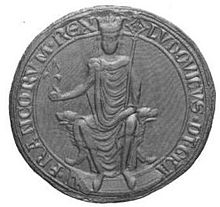Louis VIII, King of France
| Louis VIII the Lion | |
|---|---|

Louis VIII's seal
|
|
| King of France (more…) | |
| Reign | 14 July 1223 – 8 November 1226 |
| Coronation | 6 August 1223 in Reims Cathedral |
| Predecessor | Philip II |
| Successor | Louis IX |
| Born |
5 September 1187 Paris, France |
| Died | 8 November 1226 (aged 39) Château de Montpensier, France |
| Burial | Saint Denis Basilica |
| Spouse | Blanche of Castile |
| Issue |
Louis IX, King of France Robert I, Count of Artois Alphonse, Count of Toulouse Saint Isabelle Charles I, King of Sicily |
| House | Capet |
| Father | Philip II of France |
| Mother | Isabelle of Hainaut |
| Religion | Roman Catholicism |
Louis VIII the Lion (French: Louis VIII le Lion) (5 September 1187 – 8 November 1226) was King of France from 1223 to 1226. He also claimed the title King of England from 1216 to 1217. Louis VIII was born in Paris, the son of King Philip II of France and Isabelle of Hainaut, from whom he inherited the County of Artois.
While Louis VIII only briefly reigned as king of France, he was an active leader in his years as crown prince. During the First Barons' War of 1215–17 against King John of England, his military prowess earned him the epithet the Lion. After his victory at the Battle of Roche-au-Moine in 1214, he invaded southern England and was proclaimed "King of England" by rebellious barons in London on the 2 June 1216. He was never crowned, however, and renounced his claim after being excommunicated and repelled. In 1217, Louis started the conquest of Guyenne, leaving only a small region around Bordeaux to Henry III of England.
Louis's short reign was marked by an intervention using royal forces into the Albigensian Crusade in southern France that decisively moved the conflict towards a conclusion. He died in 1226 and was succeeded by his son Louis IX.
In summer 1195, a marriage between Louis and Eleanor of Brittany, niece of Richard I of England, was suggested for an alliance between Philip II and Richard, but it failed. It is said that the Holy Roman Emperor Henry VI opposed the marriage, and that its failure was a sign that Richard would name his brother John as heir to the English throne instead of Eleanor's younger brother Arthur of Brittany, whom Richard had designated earlier as heir presumptive. This led to a sudden deterioration in relations between Richard and Philip.
...
Wikipedia
